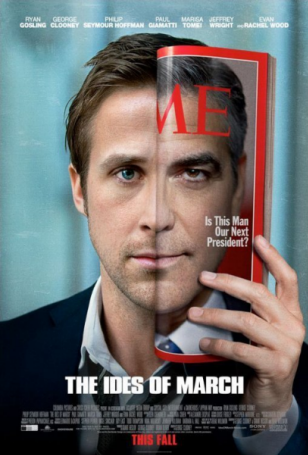By Leanna Pankratz (Contributor) – Email
Date Posted: October 13, 2011
Print Edition: October 12, 2011
 The Ides of March takes its title from the story of Julius Caesar, who was told to “beware the Ides of March.” This ended up being the date where he was stabbed 23 times and murdered in the Roman Senate by a group of conspirators. Not a happy ending. George Clooney’s The Ides of March (which sees Clooney as both an actor and director) is not set in Rome, bears no mention of Julius Caesar, and certainly sees no characters stabbed to their deaths. However, the film deals profoundly with the issue of betrayal in political affairs, and the idea that no presidential campaign is without enormous background wariness and even fear.
The Ides of March takes its title from the story of Julius Caesar, who was told to “beware the Ides of March.” This ended up being the date where he was stabbed 23 times and murdered in the Roman Senate by a group of conspirators. Not a happy ending. George Clooney’s The Ides of March (which sees Clooney as both an actor and director) is not set in Rome, bears no mention of Julius Caesar, and certainly sees no characters stabbed to their deaths. However, the film deals profoundly with the issue of betrayal in political affairs, and the idea that no presidential campaign is without enormous background wariness and even fear.
The Ides of March possesses a brilliant cast. An array of such well regarded actors such as George Clooney and Ryan Gosling also includes Marisa Tomei, Paul Giamatti, Phillip Seymour-Hoffman and Evan Rachel Wood.
The film centers on a man named Stephen Myers (Gosling), who is serving as junior campaign manager for Mike Morris (Clooney), the Governor of Pennsylvania, and presidential candidate for the Democratic Party. Myers and the senior campaign manager Paul Zara (Hoffman) are campaigning the hardest for support of Morris in Ohio. This is integral, and would guarantee Morris’s nomination for the presidential race. Morris calls Arkansas Senator Ted Pullman (Michael Mantell) his harshest competition. After a debate, rival campaign manager Tom Duffy (Giamatti) offers Myers a position in Pullman’s campaign. His offer is rebuked by Myers, who believes strongly in the political views held by Morris. Duffy leaves with a foreboding word for the young campaigner, stating that his optimism will be short-lived, and he will soon fall victim to the cynicism and corruption so abundant in the political scene. This very meeting is what sparks a small glitch in the campaign and gives rise to a whole new set of issues. Betrayal and fear has come into the equation. It’s not as simple as that, though. The question that inevitably rises is of who is really betraying who: the inexperienced young campaigner or the hardboiled politician who may have more to him than his team and supporters know.
Clooney utilizes a very fitting film-noir style – growing gradually darker as the audience progresses into the world of dirty politics. Noir-esque shadows and silhouettes abound, as well as secret conversations overrun by ominous background music. This style of filming is timeless, and gives audiences a very good lens through which to view what is essentially a descent into the minds of hardened campaigners.
It is also interesting to take note of the blatant parallels between Morris’s campaign and the 2008 campaign of US President Barack Obama. The same placards, adoring chats, catchy, promising slogans, and packaged idealism is there. Morris spouts promises so fabulously feel-good that one can’t help but question their tangibility. This is less than a film simply about the lives of candidates and their teams, but is in fact a very cynical look at the fever of optimism that surrounds a candidate with “fresh ideas.”
This is by no means an action film. Some viewers may find the film slow moving as it deals with the subject matter in a very subtle way – never once falling victim to that frenzied, high profile urgency so prevalent in today’s blockbusters. The film relies on dialogue and understanding of what goes on behind the scenes on the campaign trail. Clooney presents a smart drama that will evoke in audiences a sense of questioning of the heated, widespread support of a candidate that has been so evident in recent presidential campaigns.


